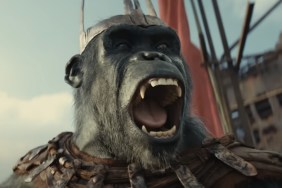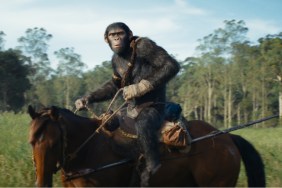
Earlier this week, ComingSoon.net brought you a report on 20th Century Fox’s recent 20 minute preview of footage from director Matt Reeves’ Dawn of the Planet of the Apes. Following the film’s presentation at WonderCon, we caught up with Reeves and stars Gary Oldman, Kerri Russell and Andy Serkis to discuss their widely imaginative followup to Rupert Wyatt’s Rise of the Planet of the Apes.
In the below interview, Russell and Oldman discuss their thoughts on science fiction and you may be surprised to find that Oldman, whose sci-fi credits range from The Fifth Element to, most recently, RoboCop, is no particular fan, explaining that Star Wars is “just not for [him]” (perhaps putting to rest recent rumors that he’s in the running for Star Wars: Episode VII). Serkis, meanwhile, offers updates on both Animal Farm and The Jungle Book while Reeves discusses the (albeit unlikely) possibility that his new film shares the same universe as the 1968 original.
SHH: You two play characters by the names of Ellie and Dreyfus. I know Jason Clarke is playing Malcolm. Are these all intended to be Steven Spielberg homages?
Keri Russell: That’s a Matt question! You know there’s a great story with Matt, which I’ll tell you. J.J. Abrams and Matt — both of whom I know from “Felicity” — when they were 13 years old. They didn’t know each other, but they were both growing up in LA. They both independently entered this teenage filmmaking contest about who could make the best movie. J.J. and Matt both tied for first place at, like, 13 years old. They met each other and then Steve Spielberg heard about it and hired them to go through all his Super-8 films and edit them. So they do both revere him.
Gary Oldman: You know what? (shouts across the room) Matt! Matt! We need you desperately, darling.
Russell: We need you! Ask Matt this question, because that’s a good question.
SHH: I’m curious if the character names Ellie, Malcolm and Dreyfus are all intended to be Spielberg references.
Matt Reeves: Are these Steven Spielberg references?! You know, that’s very funny, but it was certainly not the intention. Shoot! I have nothing else interesting to add! I should change my answer. Yes! The answer is yes!
SHH: Science fiction is a genre that you’ve both worked in before. Even “Felicity” wound up having a sci-fi tinged final season.
Russell: Yeah! J.J. was obsessed with “The Twilight Zone” and we did an episode. We actually got one of the directors from “The Twilight Zone.” They shot the whole thing in black and white. I did a sci-fi kind of thing last year, too, called Dark Skies.
SHH: And Mr. Oldman, you’ve done quite a lot of work in the genre. Is it something that specifically appeals to you?
Oldman: No, it doesn’t appeal to me at all.
Russell: (Laughs)
SHH: You don’t like science fiction?
Oldman: No, not really. I mean, I liked “Planet of the Apes” growing up. I have to say — and I know this is sinful of me. Blasphemous even — I can’t watch — I just don’t get “Star Wars.” It’s just not for me. I never read “Batman” comics. I’m not into wizards. I haven’t thought about “Planet of the Apes” since I saw it as a kid.
SHH: Would you say that that dislike of science fiction helps you find something in it as an outsider?
Oldman: I guess it’s not that I dislike it. I just don’t — I don’t know.
SHH: You don’t have that fanboy element.
Oldman: No, I never did. I didn’t read comics. I watched the “Batman” series on TV when I was kid, but I was seven or something. I watched “Doctor Who.” All sorts of things. I like, though, if I read, I like autobiographical works. I like journalism. I don’t have a great deal of time to read and when I do, I like to read something [real]. Then I find myself in these films like “The Fifth Element” and “Lost in Space.” I’m a working actor. You’ve got to put food on the table and pay the mortgage. They say they want you for “Lost in Space” and you go, “Well, what else is around?” “Nothing.” “All right, I’ll do that, then.”

SHH: In “Dawn,” you’re both the human side, literally, but is safe to say that Dreyfus is a more direct antagonist?
Russell: No one’s really an antagonist.
Oldman: The kids keep saying that! They want to make me the villain. I mean.
Russell: That’s what’s so great about it, though. There’s no villain. The only real villain is the need for survival. The apes and the humans are just out to protect their families.
Oldman: Harry Reid might call me a domestic terrorist. (laughs) Because I want the humans to survive over the apes. I must be insane! Is that racist of me?
SHH: When you say that “Dawn of the Planet of the Apes” is building to the events of “Planet of the Apes,” do you mean that fans should think of the original 1968 film as existing in this same timeline or that, after enough sequels, you could imagine remaking that original film in this new world?
Reeves: “Dawn” sets us on a trajectory. If and when we ever got to that movie, it would likely be transformed just by taking this trajectory. It might not literally be the same movie but, by the time we get there, I think it would certainly be our version of that. I also feel very strongly, though, that we shouldn’t get there too soon. I think there’s a lot to tell in that story.
SHH: I wasn’t sure if fans should be trying to come up with the “No-Prize” solution for how all the “Apes” films can exist in the same continuity. That’s not something you necessarily object to?
Reeves: No! Not at all!
SHH: Andy, do you return to the original films at all as far as evolving Caesar’s humanity?
Andy Serkis: I watched them, I suppose, right at the beginning when I was working on “Rise.” There were lots of homages there. But no, Caesar is a very particular journey because we’re starting off as real apes. It just wouldn’t have been useful. They’re at a completely different point of the evolutionary scale. We’re just at the very, very beginning. I based Caesar on a real chimpanzee named Oliver who, in the 1970s, had a lot of experiments carried out on him because they believed he was the progeny of man and ape. He was known as “humanzee.” He traveled the world and visited Japan. Very, very early DNA experiments were done on him. He walked bipedally all the time. He’d walk into this room, sit down and pick up a glass. They dressed him in clothes and put him in private jets and flew him around. Very strange. There was something, though, about his physiognomy and his facial expressions that was just so close to human. That’s because he was always brought up around human beings. I’ve done a lot of working looking at that relationship, going back to “King Kong.” How do apes move and behave when they’re surrounded by human beings? How do they behave in the wild? I spent time in Rwanda observing them and the London zoo and a number of zoos watching them. Everything about apes in captivity has a much speedier rhythym. When they put a hand out, it’s much more like a human hand. In the Rwandan mountains, everything moves at such a slow pace. It’s like some rock festival where everyone is stoned out of their brains. It’s extraordinary. Caesar in this had to be moved from that younger revolutionary character who thought he was human, realized he wasn’t, and then engaged with his own kind to galvanize them and lead them to freedom. Now here’s an ape who is beginning to feel, after these years and years, the weight and the responsiblity of it all. With that came a lot of challenges as far as how to characterize him and put that up on the screen in terms of emotional intelligence and linguistic ability. All of those things were things that we discovered. It was a pretty great journey, wasn’t it?
Reeves: The thing I felt watching “Rise” again — in between the first time I saw the movie and the time when I watched it again in preparation to come in and talk to the producers about doing “Dawn,” I had a son — watching it again, I realized that [Andy] reminded me so much of my son in it. When you look at your child, you can see the total comprehension in their eyes, but the means of expression and articulation isn’t quite there yet. You can see a whole drama going on inside them. Then there’s the idea of how to express and how to hold back. You see this crazy war with all these instincts going on. That’s what I saw in what Andy was doing with Caesar. I just thought, “This is about how we are animals.” It was so exciting and became what “Dawn” was about for me. They had pitched a story to me before I became involved. It had actually taken a much larger jump towards the final “Planet of the Apes.” The apes were much more conversive. There was all this stuff. I thought, “Wait a minute. That was what was so delicious about what was going in ‘Rise’!” That was just the beginning. They could keep going. They really didn’t go far enough. Let’s see what has been created, but let’s not lose that development because watching that development is what draw me into their souls. Caesar was so moving to me because I could feel him. He was all about that struggle going on inside. I didn’t want to skip that. To me, the idea of the final movie is, of course, that they’re already speaking like humans even though they’re still apes. That’s not as interesting to me as how they get from those beginnings. Where they’ve just moved up on the evolutionary scale. They’ve just been given that intelligence. It’s the coming into being that, to me, seemed so thrilling.

Serkis: There’s a uniformity to those earlier films, especially in the dialogue. In this, some apes are more evolved than others. Some just use gestures. It’s so uneven and interesting. I mean, if everyone can sit around and have discussions, you can sort all the problems out.
Reeves: Also, they wouldn’t need to be apes and humans. It would just be like, “Now everyone can talk to each other.” This is different. There’s a sort of primal sense to it. They’re still growing. How does all this get reconciled and how does this reflect in the apes that are sort of more stuck in their instincts. That’s what I loved about Andy in “Rise.” It’s a very empathic performance, but I could also feel his rage. It was so powerful, that modulation. Knowing that he had that power in him and yet he restrained it. That’s the thing about Andy. He’s expressing that and it happens in our film in a way that I’m really excited about. This story, as he says, is more complex. “Rise” had a very propulsive trajectory. This is about how that revolutionary now has to lead in a difficult world. When you see the modulation between being forceful and being strong in front of many in order to show that strength is what’s needed, you’ll see the humanity. He goes in to talk with his wife and tells her that he’s worried. That’s what worked so well in “Rise.” The most human character was not human. That empathic side to his character is everything that we tried to make the movie about.
SHH: Matt, there’s something very cool about your list of credits in that it sort of reads like the table of contents in an issue of “Amazing Stories.” Is that a very intentional pattern on your part?
Reeves: No! You know, the thing that interests me the most is emotion. I’m always looking for things to connect to. Empathy is the single most important thing to me. When I see a movie, I want to go inside someone’s experience. That’s what interests me. That’s why I go to the movies. There are some movies where that’s not what the interest is. Where it’s maybe about showing something from the outside in a spectacle way or maybe having villains that can be hated. But I’m always looking to get inside somebody. The movies that I love transport me in that way. I think that the idea of the genre movies that I’ve been able to do recently is that, at their heart, under the metaphors, are human stories. That, to me, has always been the thing that draws me in. At the end of the day, the only thing I can do is something I relate to. I enjoy the experience of delving into a story to find out how I really feel about something. That’s the only way I know how to do it. I wasn’t that I wanted to do an “Apes” movie. I wanted to do this “Apes” movie. I wanted to work with Andy. That emotional landscape is what interests me. The idea of having just one element of fantasy — the intelligent apes — but having everything else be grounded in something that feels really rooted in emotion and reality, that to me is thrilling.
SHH: Andy, you seem like you’ve been incredibly busy lately. I know you were looking to make your non-second unit directorial debut with “Animal Farm,” but not “The Jungle Book” is here. What’s going on with the former?
Serkis: We will be doing “Animal Farm.” It was on track to be the first thing to come out of the Imaginarium Studios, which is my company. It sort of hadn’t reached where it needed to be with the script and, in the meantime, “The Jungle Book” came along from Warner Bros. and I was absolutely thrilled to be able to asked. The script for that is really, really strong and I immediately saw a way of telling the tale. I really wanted to work on it. The methodology we’d been working on “Animal Farm” absolutely fit in terms of being able to portray animals that aren’t humanoid. We’ve done a lot of work on that front, which will play into “Jungle Book.” But it’s a great, very dark script. It has its moments of lightness, of course, but it’s very in tone with the original Rudyard Kipling. It’s a rite of passage story about Mowgli.
SHH: How do you juggle these multiple franchises? We already know there are plans for more “Apes” and you’ve got more “Tintin” as well.
Serkis: (Laughs) Well, it’ll give Matt and Dylan [Reeves] a second to write the next movie! It gives them a holiday! It’ll all work out, I’m sure. It’ll have to!
SHH: Matt, I know you have a passion project called “The Invisible Woman” that you’ve always wanted to make. Is that any closer to seeing the light of day?
Reeves: That’s a movie that I still very much hope to make one day. It’s one of those stories that’s very, very personal to me. I desperately want to make it and I very much hope that after I do this and the next movie, I’ll have time to make it. It’s a movie that I’d love to go off and do very, very quickly. It’s a small film. It’s a really small film, but a very personal film.
Dawn of the Planet of the Apes his theaters on July 11.
Dawn of the Planet of the Apes
-
Bpynmqlimaex6o4

-
Dpa_group_bridge_ver_c_srgb

-
Hr_dawn_of_the_planet_of_the_apes_19

-
Hr_dawn_of_the_planet_of_the_apes_9

-
1932693_636341946414062_2105520245_o

-
Hr_dawn_of_the_planet_of_the_apes_10

-
Hr_dawn_of_the_planet_of_the_apes_11

-
Hr_dawn_of_the_planet_of_the_apes_12

-
Hr_dawn_of_the_planet_of_the_apes_13

-
Hr_dawn_of_the_planet_of_the_apes_14

-
Hr_dawn_of_the_planet_of_the_apes_15

-
Hr_dawn_of_the_planet_of_the_apes_16

-
Hr_dawn_of_the_planet_of_the_apes_17

-
Hr_dawn_of_the_planet_of_the_apes_18

-
Hr_dawn_of_the_planet_of_the_apes_7 3

-
Hr_dawn_of_the_planet_of_the_apes_6

-
Hr_dawn_of_the_planet_of_the_apes_5

-
Hr_dawn_of_the_planet_of_the_apes_4

-
Hr_dawn_of_the_planet_of_the_apes_1









